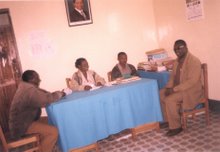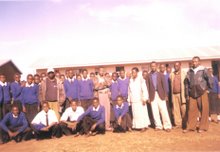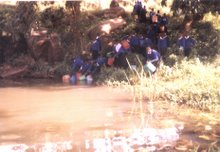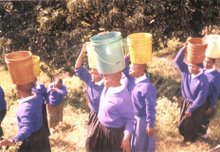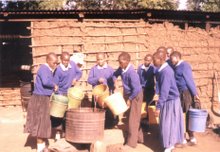Our Proposal
The students of the Smithtown School District want to help raise awareness regarding the dire impact the lack of clean water has on children of the same ages in Tanzania. Besides raising awareness, the students want to go further. While millions of dollars are pouring into Africa, the people in remote parts of the country rarely get the benefits of this generosity. The students will raise funds to drill a clean water well near two schools in the village of Bargish in the Mbulu District of Tanzania. Preliminary costs to drill a well is less than $3,000. Beyond fund raising, the students in Smithtown want to know the people of Bargish and help you to get to know them also. This is very personal for the children of Smithtown. They will make a difference in the lives of the children of Bargish. The impact will not only be to provide water for the children of Bargish; but also to offer an opportunity for our children in Smithtown to learn about the everyday lives of our friends in Tanzania.
The People of this Project:
The community of the Smithtown School District reached out to Western Suffolk BOCES for a consultant to aid them in creating a Global Education Project which had a high ratio of technology usage. Dr. Annette Shideler, a consultant of Western Suffolk BOCES, was enlisted to assist the committee in identifying an appropriate project. She realized that she had the resources to make a significant impact on the availability of clean water in a remote region of Tanzania through her personal friend, Simon Mashuri's brother-in-law. This project is empowered because individuals will impact on individuals.
Our vision is to create a living project. To create an environment in which children from vastly different cultures can recognize that friendship can grow despite the different cultures and despite the distances. We expect that children on both sides of the Atlantic will know that individuals have the power to impact on the lives of others in a positive way. And, we expect to develop a caring community so that what affects one community will be reflected in the other.
Mbulu District is where the Bargish Village is located.Mbulu District is one of the five districts of the Manyara Region. The district is located in the Northern part of Tanzania.
Climate: Mbulu district covers an area of 4.35 Sq. km (about 1.7 sq miles). It is 2,000 m (2222 ft.) above sea level. Due to the influence of the high altitude, and despite the proximity to the equators, Mbulu District enjoys temperatures ranging from 12 degrees centigrade to 28 degrees centigrade (58 - 82 degrees Fahrenheit). It has two rainy seasons -- one from October to December and the other between February through June.
Population:
The current population of Mbulu District is estimated to be 450,000 in 2006. Like all other rural areas in Tanzanie, the Mbulu District faces many social economic problems arising from rapid growth of rural populations attributed to natural growth, which puts additional pressures on the shrinking social services.
There are three major ethnic groups in the Mbulu District: Wairagw (who are dominantly agriculturists and cattle herders), Wanyaturu (who are agriculturists), and Wahazabe (Bushmen - who do little agriculture and collect/hunt). The economy of the people of Mbulu district depends mainly on agricultural crops and cattle, goats, sheep and pigs. Most of the people (90%) are living on one dollar per day. Tanzania is among the 25 poorest countries in the world.
Health Issues:
Drinking unclean water causes many diseases and leads to malnutrition is some parts of the village. Poor hygienic conditions and poor housing also account for the spread of tuberculosis and other diseases.
Malaria is still the number one sickness and killer in the District. It is possible to get medicine for the malaria, but the problem is that it has become resistant to some of the baseline drugs.
A new drug has been recently introduced, may be it will work. We don’t know.
Status of Water Supply:
There is one small lake in the District which is located 90 km (56 miles) from the Bargish Village. The lake has salty water as it is along the rift valley. There are several small rivers which feed the lake. Deforestation in the water catchment areas are currently threatening the future of these water bodies.
Forests are being depleted to meet the fast growing demands of fuel, wood and timber for the growing population
There are severe problems of soil fertility, erosion, floods, droughts, bush encroachment and over grazing which decrease the productivity of areas already under cultivation. Increased population in the villages means additional pressures are brought to bear on existing water sources. In the Bargish village there are three (3) factors which determine the consumption level of water by people. They are: availability, distance and time.
Currently the recommended minimum water requirement is 20-30 litres (21 gallons) per day. But because of all of the already described problems, most people get little more than 10 litres (10 gallons) per day. In the dry season sometimes people manage on as little as 4 litres (4 gallons) per day.
The distance to the water source can vary from between 3 kms (1.8 miles) to 10 kms (6.25 miles) depending on whether it is the rainy or dry season.
Our Clean Water Well Plan:
Our plan is to build a ring wells schema for the village. The village people will be involved in the construction of their water facility. The village will create a village water committee and establish a village fund. The well will be located near two schools - one a primary and another a secondary school with a total number of 1200 pupils.
Project Benefits:
- To establish a system through which the community in the village and individuals can become more directly involved in the management of local affairs.
- To reduce the burden on the women of the village as they will not have to walk such long distances to fetch water for their families.
- To support and improve the lives of school children who will be able to concentrate on their studies instead of wasting valuable time walking long distances to fetch water.
- To establish a water project which will build new capacity to generate a small income for the village.
Work will start at the end of June 2007 and be completed by July 2007 depending on the rains.



